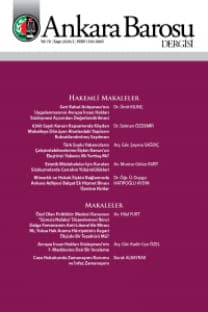Parlamenter Rejimin Olağanüstü Halde Kaldırılması (16 Nisan 2017 Referandumu ile “kabul edilen” anayasa değişikliğine ilişkin ilk gözlemler)
Bu makale, 15 Temmuz 2016’dan bu yana Türkiye’de tanık olunan siyasi ve anayasal kargaşayı ele almaktadır. Başarısız askeri darbe girişiminin ardından bozulan kamu düzeninin yeniden tesisi amacıyla olağanüstü hâl ilan edilirken parlamenter rejimin kaldırılmasını hedefleyen anayasa değişikliği, istisnai şartlarda gerçekleştirildi. Bu makalede öncelikle anayasal çerçeve içinde ilan edilen ve İnsan Hakları Avrupa Sözleşmesi kapsamında yer alan olağanüstü hâl uygulaması ele alınacak. Ardından, anayasal düzenin devamlılığı içinde gerçekleşen bu (son derece radikal) anayasa değişikliği, hem süreç ve usul hem de hukuk devletinin gereklilikleri açısından değerlendirilecek. Son olarak, insan haklarına dayalı demokratik hukuk devleti olduğu kabul edilen bir siyasi organizasyon içinde bu “yeni düzen”! ne ölçüde kalıcı olabilir, bu sorgulanacak.
This paper discusses the politico-constitutional upheavals that took place in Turkey since 15 July 2016. While a state of emergency has been proclaimed to restore the public order disturbed by the attempted military coup, a constitutional modification, addressed to remove the parliamentary system, has been adopted under exceptional circumstances. The first question we considered in this paper is the constitutional practice of the state of emergency proclaimed, both in the perspective of the binding Constitution and the European Convention on Human Rights. Secondly, we analyzed the constitutional modifications, which appear very radical with respect to the continuity of the constitutional order, with respect to the time dimension of its effects, to the procedure adopted and the requirements of the rule of law. We finally asked ourselves whether such “new order”! is sustainable in a political organization conceived as a democratic State based on the rule of law and the respect of human rights.
___
- ISSN: 1300-9885
- Yayın Aralığı: 4
- Başlangıç: 1942
- Yayıncı: Ankara Barosu Başkanlığı
